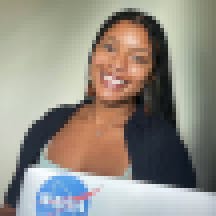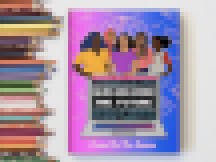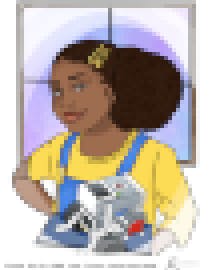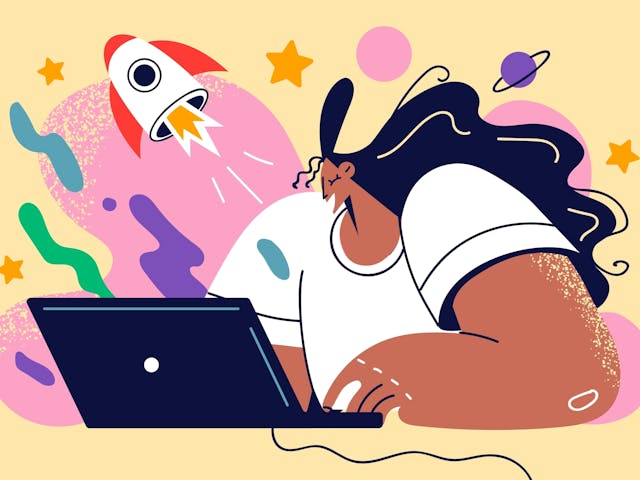In an education landscape awash in technology, what impact could something as analog as a coloring book make? Especially for youngsters diving headlong into computer programming with an organization like Black Girls Code.

The answer is — a lot more than you’d think, according to 22-year-old Nia Asemota. The New York University student is the creator behind “Black Girls Code the Future,” a 36-page coloring book highlighting the achievements of Black women in tech.
The idea came to Asemota, who is in her final semester as a biomolecular science major with a computer science minor, during the doldrums of pandemic lockdown isolation in 2020. Coming from a Puerto Rican and Nigerian background, the native New Yorker says there have been plenty of times where she’s felt like the odd woman out in a computer science class or has felt discouraged by advisers about her plans to pursue a career in tech.
EdSurge caught up with Asemota to talk about her unexpected path to computer science, and how becoming a mentor to other Black girl coders sparked her passion for representation in the sciences. The interview has been edited and condensed for clarity.

EdSurge: Why did you decide to create a coloring book, of all things, about Black women in STEM?
Nia Asemota: I've always been drawing ever since I could hold a crayon.
Then in March 2020, the pandemic hit. We're all kicked out of school, kicked out of the dorm, and honestly, it was so chaotic, and I'm just at home, like, “What do I do to not lose my mind?”
I've always had a passion for drawing, so that became a huge stress reliever for me.
And I was just reflecting back on when I was younger, and what I would color in my coloring books. I would make them brown to look like me. Growing up, you realize that they're not meant to look like you. You know what I mean? I never had one with curly hair, just Afrocentric features.
I was also teaching at Black Girls Code and [thought], “How do I put these two together?” That's sort of where I landed with the coloring book, and I wanted to take it a step further.
In the book, obviously there's images of girls coding together, building robots together, just showing what they can do, but then there’s the teaching side of it.
One of the things that I feel like is a barrier to tech is language. In my experiences in my CS classes at school, it seemed like a lot of the words are like big terms that I didn't know the meaning of. So let me just include that in the book, just to introduce and build that language so that, maybe when they get to high school, they can participate at the table.
And then also thinking about role models and how a lot of these amazing women are written out of the textbooks, and we don't hear about them. I want it to include these women that [Black girls] can see themselves in.
Well-known people like Mae Jemison and Katherine Johnson [of NASA]. I want to include their stories and quotes that the girls can color and learn and be inspired by.
Some of them, I've never heard about, and that's more reason to include them. Like [Gladys West], the woman who made major marks on creating the GPS as we know it today, was Black. Ayanna Howard, who used AI to help send the Mars Rover into space, is Black.
You don't hear about them. I was like, “Let's change that.”
You come from a Puerto Rican and Nigerian household. Did those cultures influence your plans for your education? Were your parents tech professionals?
Culturally speaking on both sides, it's like, “[Become a] doctor, lawyer, engineer,” but very heavily on doctor. I remember growing up, my mom would do my hair, and we would watch “Grey’s Anatomy” together, and Cristina Yang was a huge influence for me. I wanted to do cardiothoracic surgery just like her because I thought it was so cool.
And then in high school, the same thing: joining the medical clubs, taking all the courses that would align me [with medicine], volunteering at hospitals, then going to medical school. That’s sort of how I had it mapped out.
How did you get involved with computer science and coding?
It was in high school freshman year. My mom encouraged me to join the robotics team, and there was a lot of pushback from me because I was like, “Why would I do that? I already have my whole life set out for medical school. Robotics is not in the picture. This, that, and the third.”
I was the fifth girl on the team. Mind you, I didn't know how to code, didn't know how to use any of the heavy tools that they use, didn't know the behind-the-scenes electrical processes. So I very much stuck out like a sore thumb. But at the end of the day, I really loved the project that we were doing.
You ended up going to an international robotics competition, and that’s where you met an all-girls team.
That was a breakthrough for me because I was like, “How do I become more hands on and vocal during these team meetings?” Because previous to that, the girls [on my team] would organize the toolbox and just do all these miscellaneous tasks. We weren't hands on.
So that's when I went to Youtube [to learn], “I want to make the robots’ wheels turn, how do I code that? How do I wire the motors?” That was a huge learning experience for me, and I was able to bring those skills to the team. Long story short, right before graduating, I wound up leading the programming and electrical departments of the team.
And then going into college, I still knew in the back of my head that medical school was a path for me, but I gained this newfound love with engineering and creative problem-solving. I was like, “OK, how do I combine that?” And for me, the solution was biomedical engineering.
Did your mom ever explain why she was pushing you so hard to join this robotics team?
It's so cute because she reads her little articles all the time, and [one article was about] how robotics is super emerging, and there are intersections of robotics and everything. So she was thinking that it’s something enjoyable and would be something that will stand out to colleges — she was thinking larger picture than I was.

It seems like it made you rethink your whole script for how you thought your academics would go.
When you're in those full circle moments, it's so strange because — like I said — I was doing bio and CS at school. In general, NYU was very strict on the classes that you can take. But with the pandemic, things became more flexible, and I took a few AI classes because it really piqued my interest.
That [class] was about robotic-assisted surgeries, and I was like, “Oh, wow! I was a robotics student in high school, and this is medically aligned.” And now you're putting AI on top of it, and that's so cool to me. Through that process, I fell in love with computer science.
You’re a computer science student, you’ve interned at NASA, and now you’re an associate product manager at Spotify. What have your experiences with representation in STEM been like?
Some of the biology classes are smaller — like 20 people — so if I was the only [person of color], or if I was one of two, it was sort of expected. But for CS, it was a 150-person class, and I was the only person of color. Not only woman — person. Do you know what I mean?
Looking around, you feel it. I felt like I had a huge chip on my shoulder because I was new to this field, and by this point everyone in the class was coding since the womb and works at Google and Meta for two years already.
And then also, none of my teachers looked like me, could relate to me, and there's those microaggressions, or comments that they would say.
Can you give an example of a comment or microaggression?
Oh, my God, let me tell you! I remember my advisers questioned my choices to study [computer science] so many times. I got told, “You're not going to graduate. You should switch. You're not smart enough for this. Look, you should consider different career paths.”
Did those experiences lead you to seek out an organization like Black Girls Code?
Around the time I was applying to different schools, I actually found out about them through NYU, which was so strange. I found Black Girls Code at the bottom of some [NYU] page and signed up, probably my junior year of high school.
We went to the Google office in Chelsea, and we coded our own Pac-Man game. That was really fun, and then I did some programs with them here and there.
That was like a huge stepping stone for me because the community was so supportive. In college I was like, “I’m doing CS now. How do I give back to my community?”
That was something that also helped me with imposter syndrome and getting through the difficult days at school and just being the only person [of color] in class. Because it gave me a reason to go forward. The group of girls that I taught was 7 to 13, and it's like, “I need to get stronger in my coding skills to be able to teach them and let me be the example that they're lacking.”
That's a great motivator to get better at anything — when you want to teach it to somebody else. Did it help push back against some of these messages you were receiving, that maybe computer science isn’t for you?
It helped me build a community with the girls that were my age. And with some of the instructors that were already in their careers but also volunteering at Black Girls Code — who are software engineers at Adobe or Pinterest or whatever, right? I was able to hear their stories, what got them interested in CS or about what resources can help me.
What would also happen is that say, for example, the workshop was on a Saturday. About two weeks in advance, you would start to prep. We would get the curriculum, and I would be able to have a preview ahead of time and be very hands on with the programming language at hand — to understand it enough that I can break it down for a 7-year-old. So even that helps me develop my skills along the way.
It seems like a lot of time when we talk about diversity and representation in STEM, we're starting from this status quo that it's mostly white men in the industry. But looking at your coloring book — there's so many women who have contributed — it's clearly not the case, right?

It's so interesting you say that. I just started a TikTok page and, in one of [my videos], I was coloring in Mae Jemison.
And there was this girl, I believe she was like in middle school, and she comments under my video, “Oh, my God! She's such a huge inspiration for me. We're learning about her in school,” and she's like, “I didn't think that girls can go into space until reading about her.”
This is why I do it.
And also, I'm Puerto Rican and Nigerian, and I'm launching a new [coloring book] for Latinas in tech, and there's so many Latinas that I didn't know about before doing amazing feats, too.
I feel like this is my calling. Through a creative lens, how do I make sure people [like me] are seen, heard, represented, but also gain exposure to new role models that are unfortunately written out of our history books?
What are some things that people, whether they were teachers or mentors or just friends, said to you that were helpful and encouraging as you pursued your STEM interests?
“Be the change that you want to see.” That was a heavy one for me, especially when I was going through my classes and struggling. I remember having conversations with friends and family and just solidifying, “What is my ‘why?’” Because once you know your “why,” you're set.
They really emphasized the notion of paying it forward. If I dropped out, or if I wasn't in that CS classroom, I wouldn't be able to tell my story and just give advice and pass it down to younger generations.
“What do you wish that you had when you were younger?” Take that into teaching the girls — what is something that you wish you knew? Just being a presence, especially for younger students, and making that my motive.


